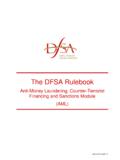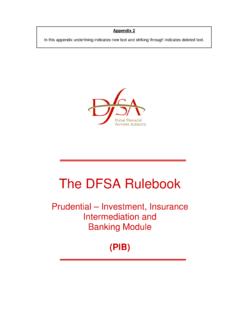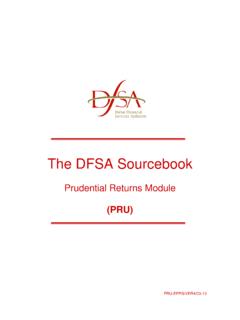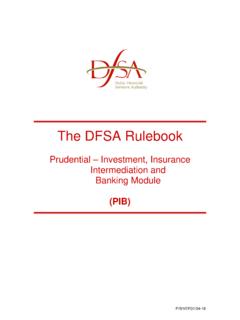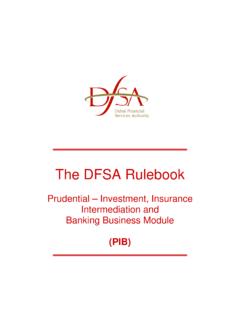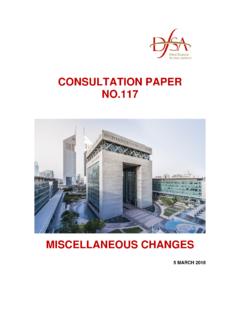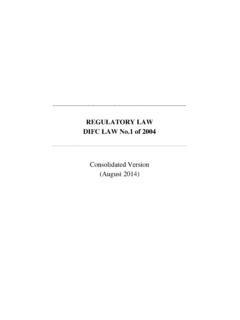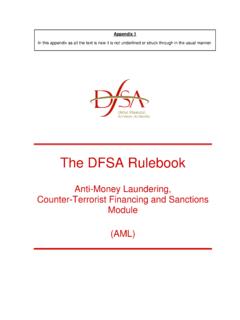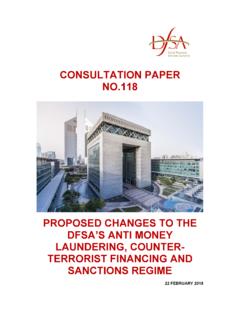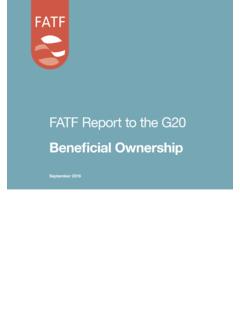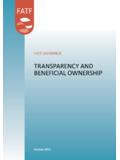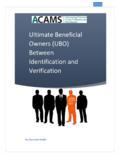Transcription of DFSA Consultation Paper
1 Consultation Paper PROPOSED CHANGES TO THE DFSA S ANTI MONEY LAUNDERING, COUNTER-TERRORIST FINANCING AND SANCTIONS REGIME PHASE 2 18 APRIL 2018 CP120 CHANGES TO DFSA S AML REGIME 18 April 2018 Page 2 PREFACE Why are we issuing this Consultation Paper (CP)? In advance of the upcoming Financial Action Task Force (FATF) Mutual Evaluation of the United Arab Emirates (UAE), the DFSA is proposing changes to the Anti-Money Laundering, Counter-Terrorist Financing and Sanctions Module (AML) of the DFSA s Rulebook. The changes proposed are to ensure that the DFSA s AML regime is compliant with the 2012 FATF Recommendations1 (the 2012 Recommendations). Who should read this CP? The proposals in this Paper should be of interest to Relevant Persons, including Authorised Firms, Authorised Market Institutions, Designated Non-Financial Businesses or Professions (DNFBPs), to their advisers, and to applicants and their advisers.
2 Terminology In this CP, defined terms are identified by the capitalisation of the initial letter of a word, or of each word in a phrase, and are defined in the Glossary Module (GLO). Unless the context otherwise requires, where capitalisation of the initial letter is not used, the expression has its natural meaning. What are the next steps? All comments should be emailed to using the table provided in Appendix 3. Please refer to the CP number in the subject line. You may identify the organisation you represent in providing your comments. The DFSA reserves the right to publish, including on its website, any comments you provide, unless you expressly request otherwise at the time of making comments. The deadline for providing comments is 20 May 2018.
3 Once we receive your comments, we shall consider if any further refinements are required to these proposals. We shall then proceed to make the relevant changes to the DFSA's Rulebook. You should not act on these proposals until the relevant changes to the DFSA Rulebook are made. We shall issue a notice on our website telling you when this happens. Structure of this CP The remainder of this CP contains: (a) background to the proposals; 1 The International Standards on Combatting Money Laundering and the Financing of Terrorism and Proliferation. CP120 CHANGES TO DFSA S AML REGIME 18 April 2018 Page 3 (b) specific issues to note; (c) an explanation of the proposed changes to the AML Module; (d) Appendix 1: draft amendments to the AML Module; (e) Appendix 2: draft amendments to the COB Module; and (f) Appendix 3: template for providing comments on this CP.
4 BACKGROUND 1. FATF is the global standard setter in the fight against money laundering and combatting the financing of terrorism and terrorist acts. They have developed Recommendations, which set out the legal, regulatory and operational measures that countries must have in place to protect the financial system from misuse. 2. These Recommendations are revised periodically to ensure that countries respond to current money laundering and terrorist financing threats (AML/CTF) as well as other threats to the financial system. The methodology, which accompanies the Recommendations, is also revised on an on-going basis, most recently in February 2018. 3. FATF monitors, by means of a Mutual Evaluation (ME), the progress of its members (which includes the UAE) in implementing these Recommendations.
5 This ME also evaluates how effective their AML/CTF measures are. After a ME is carried out, a follow-up process provides a framework to monitor progress made by the countries to address any deficiencies identified. 4. The UAE, including the DIFC, was last subject to a FATF ME in 2007. The relevant ME Report was published in April 2008. The ME report identified areas requiring improvement. The DFSA made changes to its Rules, in response to the recommendations in the report, at that time. 5. In 2012, FATF updated and issued a set of Recommendations (2012 FATF Recommendations), with a particular emphasis on a Risk Based Approach. In response to the 2012 FATF Recommendations, the DFSA undertook a review of its entire AML framework, which resulted in the creation of a new AML regime that covered both Financial Institutions and Designated non-Financial Businesses and Professions (DNFBP).
6 These changes came into effect in July 2013. 6. In late 2015, the DFSA carried out a further assessment of the AML regime against the 2012 Recommendations and the Federal AML Legislation (updated in 2014), and identified areas in the AML Module that need to be enhanced. Those changes CP120 CHANGES TO DFSA S AML REGIME 18 April 2018 Page 4 were proposed in June 2016 and came into effect in February 7. It has now been confirmed that the next UAE FATF ME will take place in the second half of 2019, and preparations have begun at a Federal level to coordinate the UAE s response. The DFSA, as a stakeholder, is expected to contribute to this ME. Over the course of the last nine months, the DFSA has reviewed its AML regime (via a self-assessment process) to assess whether it meets the Recommendations set by FATF.
7 8. The DFSA identified areas that required change and consulted on those in March 2018 in CP118. Those changes related to the DFSA s AML remit in the DIFC and the DFSA s regulation and supervision of DNFBPs. In that CP, we let firms know that we expected to propose further enhancements to the AML regime later in 2018 in the lead up to the UAE s ME. The reason for consulting in two parts related to the proposed changes to the Regulatory Law 2004 in CP118. If we were to get those changes to the Law enacted by June 2018, and present them in our final technical assessment for the FATF mutual evaluation, they had to be sent to HH the President of the DIFC and then to the Ruler for their consideration by April 2018. 9. We have now considered what further enhancements are required to ensure the DFSA s AML regime is compliant with the 2012 Recommendations, and those are set out in this CP.
8 SPECIFIC ISSUES TO NOTE 10. There are some specific points we would like draw attention to in this CP. Firstly, there are four elements in the 2012 FATF Recommendations that FATF requires to be embedded in primary legislation the overarching concept of Consumer Due Diligence (CDD); Record Keeping; the obligation to file Suspicious Transaction Reports (STR); and tipping-off provisions3. FATF requires the remaining detail in relation to these Recommendations (and of course the remaining Recommendations), to be included in enforceable means such as Regulations. These four areas are of the utmost importance to FATF assessors when carrying out a ME, and compliance with these Recommendations is scrutinised very closely.
9 You will see that we have proposed some detailed changes in respect of CDD and Record Keeping4 reflecting the importance placed on them by FATF. 2 The changes can be found here: (14). 3 The obligation to provide STRs and the prohibition against tipping-off are set out in the UAE s Federal AML Legislation. The requirements to conduct CDD and retain records are set out in the DFSA s Regulatory Law 2004 (the latter relating to record keeping was included in our proposed amendments in CP118). 4 The overarching responsibility for STR s and tipping-off lies with the UAE Federal Authorities. CP120 CHANGES TO DFSA S AML REGIME 18 April 2018 Page 5 11. Secondly, as DFSA Guidance is indicative,5 and not binding, it cannot be presented to FATF assessors as part of the assessment.
10 This means that, in some situations, where the Recommendations (or parts) have been referred to in DFSA Guidance, the assessors would be obliged to conclude that the standard is not met. This has led the DFSA to reassess what material should be in Guidance, and what in Rules, and propose changes accordingly. 12. Lastly, FATF consistently reviews and updates the Recommendation methodology in light of market developments and emerging risks (as referred to in paragraph 2). For example, Recommendation 8 in respect of non-profit organisations was updated in November 2017, and Recommendation 2 on national cooperation and coordination was updated in February The DFSA (and the UAE) will be evaluated against the most recent methodology. We will, therefore, be keeping track of updates and may have to propose further enhancements to the AML Module to ensure that we are compliant with them.
